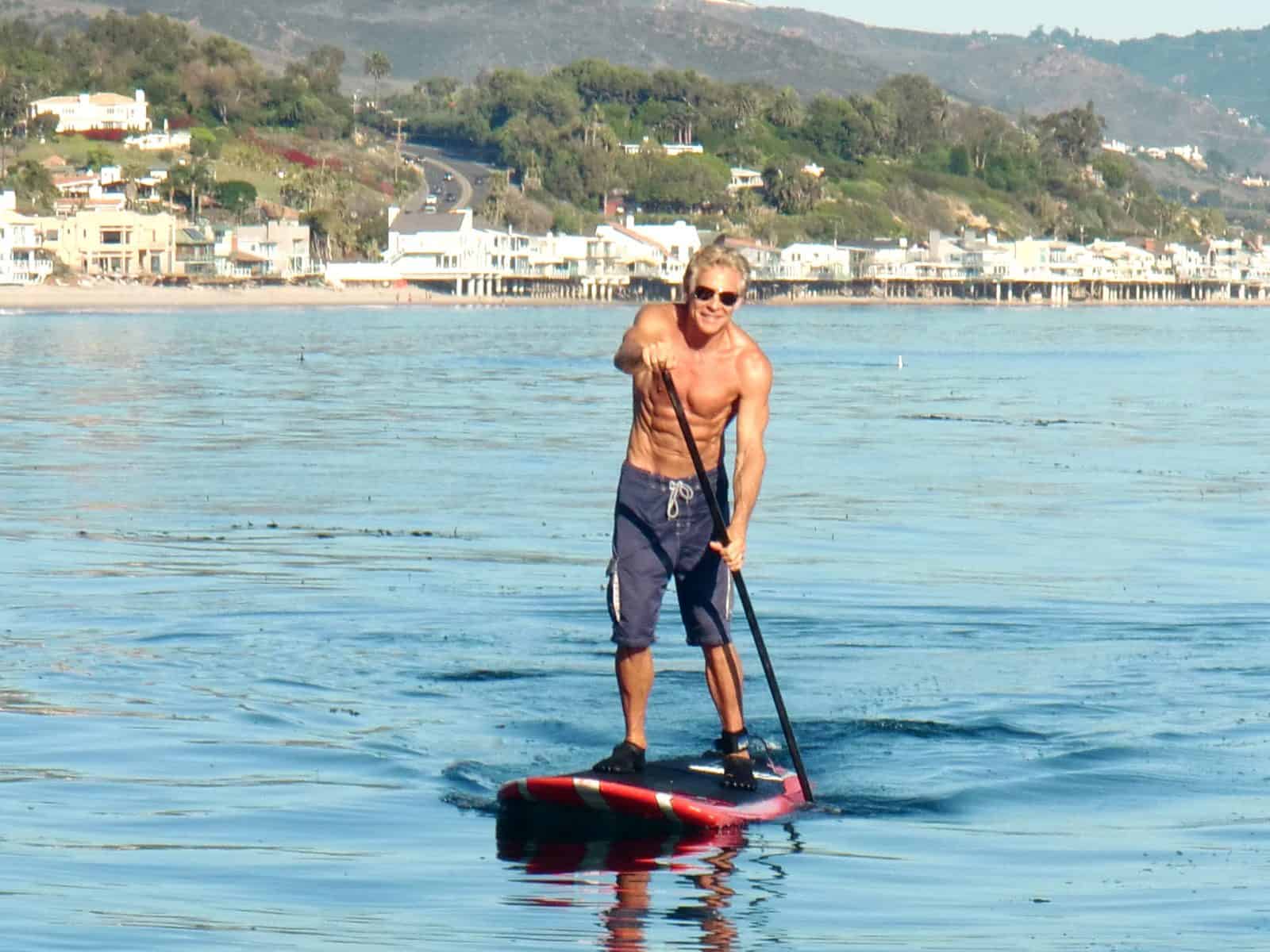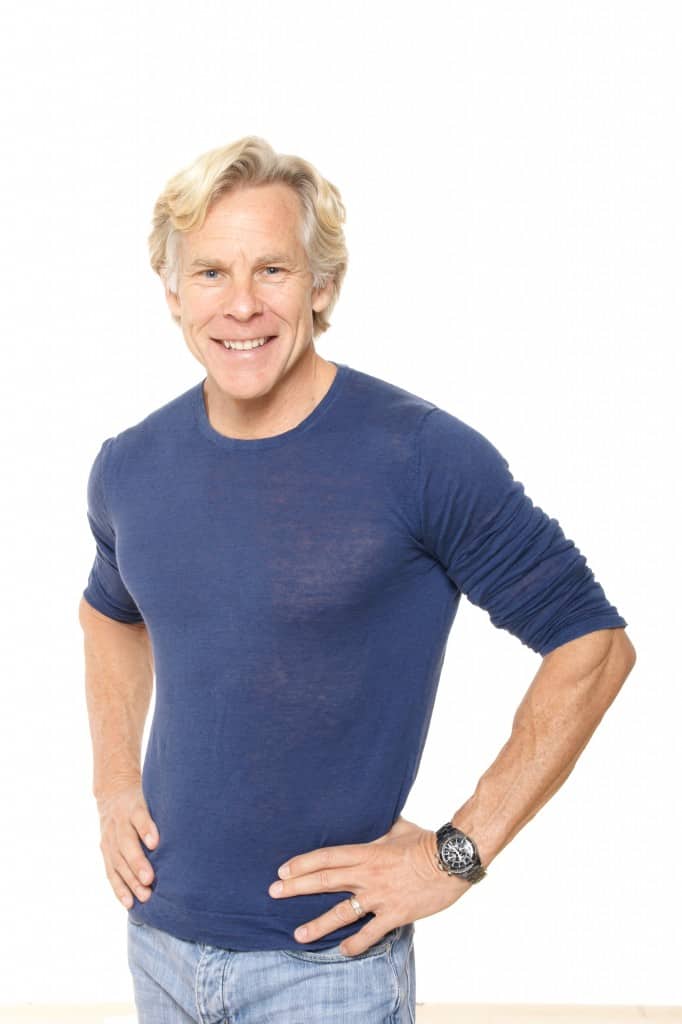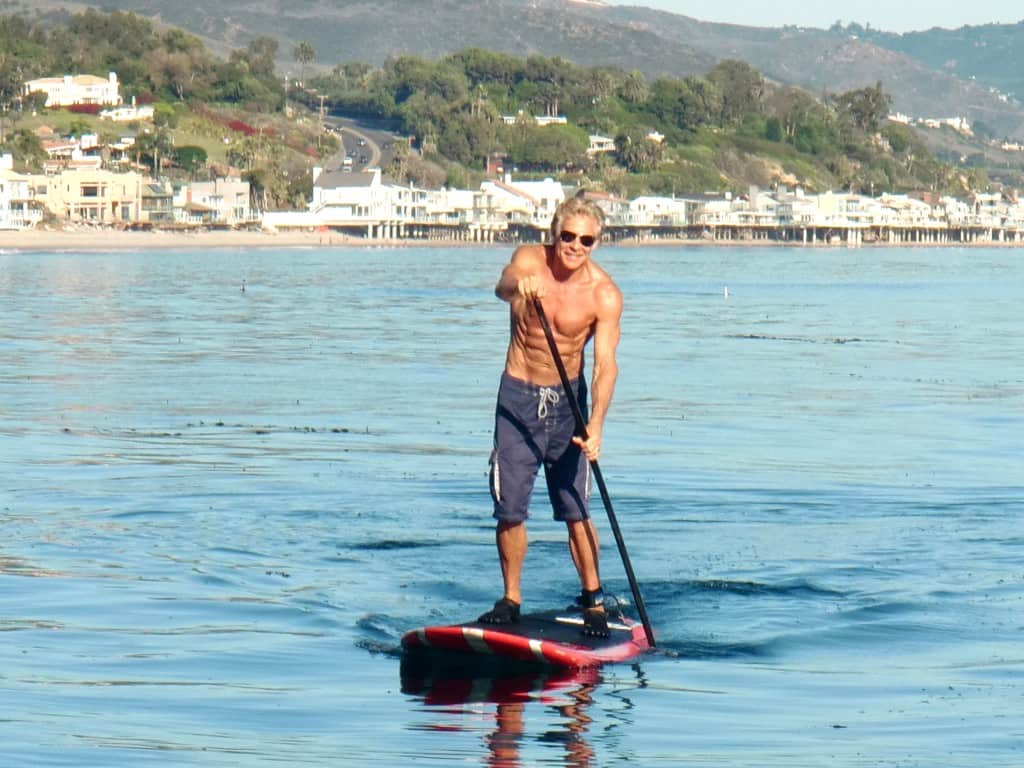Inspiyr spent some time with Mark Sisson, author of the bestselling health book The Primal Blueprint and top-rated health and fitness blog MarksDailyApple.com. Mark discussed the ideas behind his primal living philosophy, and shared advice on fitness, business and life success. Being a former world-class marathoner, Ironman triathlete, liaison to the International Olympic Committee representing the sport of triathlon, and founder and CEO of Primal Nutrition, we thought we’d be able to learn a lot from Mark. And we certainly did…
You’ve been an athlete your entire life. As you’re approaching your 59th birthday, you’re still in excellent shape. How do you do it? What’s your secret to life-long fitness?
I made my short, intense workouts shorter and more intense, and my long, slow workouts longer and easier. Instead of maintaining elevated intensity for hours upon hours on a fifteen mile training run, I go for a half-day hike where I’m exerting myself, but I’m not huffing and puffing and miserable. Instead of half-assing it, I really go for it. I up the intensity and drop the volume. I’ll run short sprints, lift some heavy weights for lower reps, or carry something heavy on my shoulder, like a sandbag, around for a few hundred yards. You get more bang – and a greater hormonal response – for your buck this way. Plus, it’s far more sustainable, especially as you age.
My secret to life-long fitness, besides shortening my hard workouts and extending my easy workouts? Training to play. See, because I came from such a grueling endurance athletics background that made me hate fitness for a while, my primary goal is to enjoy my physical activities. To have fun moving, running, jumping, climbing, throwing. In short, I play. I stand-up paddleboard, I snowboard, I play Ultimate frisbee every weekend, and yes, I train here and there. But by making sure that the real reason I exercise and train is to support my play, I never get bogged down in miserable workouts that sap my energy and will to live. Play is essential. I don’t care what you do for fun. Tag, capture the flag, soccer, martial arts? They all work. Just do something physical that you enjoy, and then train just hard enough to maintain your desired level of proficiency in that activity.
What advice do you have for our readers who are in good shape, but want to take it to the next level?
Don’t.
Seriously, before you try to reach “the next level,” think long and hard about your reasons for doing so.
“Being healthier” is not a good reason.
Being an elite athlete made me unhealthy. To fuel my training, I had to eat junk carbs and refined grains, and lots of them. All the pavement pounding gave me chronic tendinitis and arthritis. Running 100+ miles a week, plus all the grains, left me with chronically elevated systemic inflammation, and with my depressed immune system I got three or four serious upper respiratory tract infections every year like clockwork.
“Being fitter” is not a good reason, either.
Back when I ran marathons and did triathlons professionally, I looked fit. Heck, if you use a narrow definition of the word, I was fit. I could run, swim, and bike long distances fairly quickly. I could eat whatever I wanted without gaining weight. But if you asked me to bench press or squat my own body weight, I couldn’t have. If you invited me to go on a hike the day after a training session, I wouldn’t be able to move. If I wasn’t training, I was hobbling around like an old man, complaining about my sore ankles or a bad knee.
If you want to be an elite athlete, the rest of your life is going to suffer. You won’t have time for anything but training. And there’s a very good chance that doing the thing you used to love – whatever athletic pursuit you’re engaged in – will become the worst chore in the world. At the peak of performance, life undoubtedly suffers. You can still chase it; just be aware of the price you may have to pay.
Can you tell us about the nutrition philosophy behind your book, The Primal Blueprint?
Sure, it’s pretty simple. For tens of thousands of years, and even longer if you include other members of the Homo genus, we were hunter-gatherers with access to nothing but wild-caught meat, seafood, roots, fruits, nuts, tubers, and all manner of edible vegetation. This environment of natural food sources was the site of our evolution. Our metabolisms, our musculoskeletal systems, our brains, our hormones, and our physiology evolved with this dietary environment as a driving force. As such, we were “designed” to function optimally on these whole real unprocessed foods. And since we’re genetically quite identical to those early hunter-gatherers, my view is that we still function best eating a diet composed mostly of those whole foods. We must also consider what wasn’t available to us. What foods weren’t eaten by early humans? What foods failed to participate in our evolutionary design?
Well, if you go back 10,000 years, to the advent of agriculture, grains, legumes, and dairy are recent additions to the human diet and only possible in an agricultural setting. There’s evidence of limited adaptation to some of these foods, but it’s not widespread or conclusive.
If you go back 100 years, processed food, refined sugar, and vegetable oils like corn, canola, and soybean have begun to enter the diet en masse. There is no way that we’ve adapted to this stuff, and anytime these dietary agents are introduced to a population, obesity, diabetes, and all the metabolic diseases soon follow.
Ultimately, my dietary philosophy celebrates the sure things about what we’re adapted to eat – the meat, the vegetables, the fish, the fruit, the roots, the nuts. You start with that stuff, see how it affects you, and if you want, you can try some of the newer foods to see how you tolerate them. Most people find that sticking to that original list works out the best, and that adding back in grains or beans or refined sugar brings back the health problems. I’m among them.
Food companies spend lots of money creating new products that are either genetically or artificially engineered to taste great and last a long time. Why should men steer clear of these “foods”?
As you said, these foods have teams of brilliant scientists, food engineers whose sole job is to create food products that are irresistible. And it’s not just about tasting good, because a can of Pringles doesn’t taste nearly as good as duck confit. It’s about targeting the reward centers in the brain, the same areas that control our response to addictive behaviors and substances. These food scientists employed by the processed food companies use their deep knowledge of the reward system to design products that override our natural impulse to push a plate of food away and say “I’m full, I’ve got enough nutrients for awhile, and I don’t need any more food.”
Processed food is literally designed to make you want to eat more and more of it without ever getting full, sated, or satisfied. Eating these foods makes calorie-counting useless or, at best, inefficient, because you’re always gonna be up against perhaps the most powerful, unignorable instinctual drive: hunger.
In other words, processed food is the greatest marketing ploy of all time. “Betcha can’t eat just one”? “Once you pop, you can’t stop”? These aren’t just clever slogans. They’re the honest truth about how this food affects your body and your brain. If you want to have control over how food affects you, how you eat, and how much you eat (without having to constantly exert superhuman levels of willpower), you’re better off just avoiding processed food altogether.
You turned your passion into several successful businesses. What advice do you have to our readers who want to branch out on their own to start a company?
It’s an old cliche, but it’s still so true: find something you are passionate about and can see yourself doing whether or not you ever become wildly successful at it. Then, be relentless in your pursuit of it. My favorite mantra, whenever I feel inundated or overwhelmed: if it were easy, everyone would be doing it.
How do you define success?
Being able to provide for my family while doing something I love and that offers real benefits the greater good of all people.
What has been the most rewarding day in your career?
Probably the day my book hit number 2 on the All Books Amazon bestseller list. It showed me not only the power of well-directed and focused marketing, but it also proved that the world was ready for this radical new lifestyle I had been espousing in blog posts. My staff and I were honestly surprised – pleasantly, of course – and we’ve only continued to grow since then.
That’s the day I realized that I might actually be able to make a difference in a significant number of lives.
What’s the best advice you’ve ever received?
Good ideas – even great ideas – come and go, but perseverance is the most important attribute for an entrepreneur.
I’ll also include another one: There’s no failure, just feedback. Art Devany, an old friend of mine and the guy who got me interested in evolutionary health, gave me that one. It doesn’t just apply to health and fitness, either. It’s just a darn good way to approach business, relationships, and life in general. If you can leverage your “failures” into lessons for what not to do next time, you’ve won, because you’ll have access to a virtually limitless trove of data upon which to draw. I know I’ve certainly accumulated tons of extremely helpful “feedback.”
What’s next for you?
My focus on educating people in ways they can regain their health has led to my starting a separate publishing company that is focused on more specific books, seminars and certifications. I feel as if the Primal Blueprint is poised to have a huge impact on the health and happiness of millions of people globally.
As for my work, I’m finishing up my latest book, Primal Connection, which examines all the other ways in which we’ve departed from our evolutionary upbringing, to our ultimate detriment. As I’ll show in the book, it’s not about wearing loincloths and living out in the forest; it’s about taking the lessons from our past and applying them to our modern lives to see where the disconnect lies. Even though we’re living longer than ever, we’re not living better. There are some missing pieces, and I think they can be found – or at least the clues can – by looking to our ancestral environments.
Thanks for being an inspiration to us Mark, and stay primal!




1 comment
I really luv football, an i wich u could help me inprove my football dreams
Comments are closed.